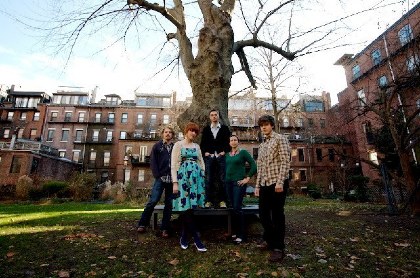- country:USA
- style(s):Bluegrass
- label:Signature Sounds
- artist posted by:Unique Gravity
Links
Welding a vast range of musical experience to a deeply-shared common vision, the kaleidoscopic stringband sound of Joy Kills Sorrow does not so much shatter the boundaries of various styles as it disregards them entirely. The result is liberated and liberating music – something entirely unique fashioned from recognizable shards of bluegrass, jazz, indie rock, folk, R&B, and Celtic traditions. “Despite our varied backgrounds,” explains founding guitarist Matthew Arcara, “we’re all on the same page when it comes to what we want to play, how we want to play it, and what we want to work towards and accomplish. The amount of time and focus we devote to the smallest details is what makes this band unique. Instead of feeling like it’s coming from a lot of different places, it’s taking on its own identity.”
Darkness Sure Becomes This City, Joy Kills Sorrow’s first national release, is a bold consolidation of all the ensemble has achieved thus far, and points towards a rich and rewarding future for this ever-evolving outfit. Available February 23, 2010 via Signature Sounds, Darkness Sure Becomes This City features an astonishing spectrum of instrumental textures applied to poetic, evocative songs that echo the timeless yearning of traditional American stringband music in very modern lyrical, harmonic, and rhythmic contexts. On a purely technical level, the band boasts a remarkable cast of resourceful, accomplished instrumentalists: guitarist Arcara was the 2006 winner of Winfield’s National Flatpicking Championship, mandolinist Jacob Jolliff was the first full scholarship mandolin student at Berklee College of Music, banjoist Wesley Corbett has performed nationally with Crooked Still and the Biscuit Burners, and bassist and songwriter Bridget Kearney won the John Lennon Songwriting Contest in 2006. Versatile and powerful vocalist Emma Beaton was named Young Performer of the Year at the 2008 Canadian Folk Music Awards.
Rather than descend into endless jamming or genre pastiches, Joy Kills Sorrow hones in the elements of their sound with an almost surgical precision, always mindful of the message of the song or spirit of the melody in question. “The banjo, guitar, and mandolin communicate so well together,” observes Kearney. “Both when they are improvising and when they are playing background parts, everything is so delicate – leaving room for the vocals but making statements on their own. That’s something we spend a lot of time on. Every verse is put under the microscope.” “We have always tried to approach all the songs from the perspective of ‘What does this need?’” Corbett adds. “As opposed to ‘What do I want to do?’” While the consistently innovative instrumental sophistication repays repeated listening, the plainspoken poetry of the songs (largely by Kearney) and Beaton’s clear, uncluttered delivery makes the overall performances instantly relatable. The sum impact is haunting and disarming – strangely familiar and yet otherworldly.
The haunting original songs on Darkness Sure Becomes This City – six by Kearney, two by Beaton – helped further distinguish the band. As she began to contribute more songs to the band, Kearney abandoned her own preconceptions about the limitations of stringband music. “Eventually I learned that it was better to write what I was going to write, rather than try to be genre-specific.” Several of Kearney’s contributions actually started out as instrumental pieces from the book of her jazz quartet, which featured two saxophones, bass, and drums. “So,” Kearney explains, “not only were they instrumental, but they were pretty bare-bones as far as how much of the harmony was stated, since there was no piano or guitar. When they were translated into a band that has three instruments that are playing the chords, it added a lot to the experience of the song. They took on new life.”
A week of rehearsals over Christmas of 2008 prepared the material for an early 2009 tour, where the songs were scrutinized and refined as they were performed. In March, they went into the studio with producer Eric Merrill. Merrill introduced “Send Me a Letter” to the group – a propulsive, bluegrass-tinged pop song penned by Kristin Andreassen (Uncle Earl, Sometymes Why) that the band worked up immediately. The song’s contrapuntal vocal outro points to a new development in the group’s arsenal: backing vocals. “Bridget, Wes, and Eric Merrill spent a lot of time arranging the background vocals,” says Arcara. “A lot of those hadn’t really been written when we got into the studio.”
“Eric saw the whole concept of a band having three-part harmonies as a big part of the record,” Kearney adds. “Now it’s a big part of the band and is something we are really making use of…now we do it live and are working into a lot of new stuff.”
Since recording Darkness Sure Becomes This City, Joy Kills Sorrow as continued to grow. Kearney and Corbett have begun composing songs together, and several of their co-creations have already been added to the band’s setlists. As hinted at on Darkness Sure Becomes This City, the potential and possibilities open to such a virtuoso, open-minded band such as Joy Kills Sorrow are seemingly limitless, and remain rooted in a philosophy first stated at the band’s outset over five years ago. “We’ve always had a wide encompassing view of what we think of acoustic music,” concludes Arcara. “We’ve always said, ‘Let’s play it the way we want to play it and not worry about the way other people play it or what traditionalists will make of it…’”



